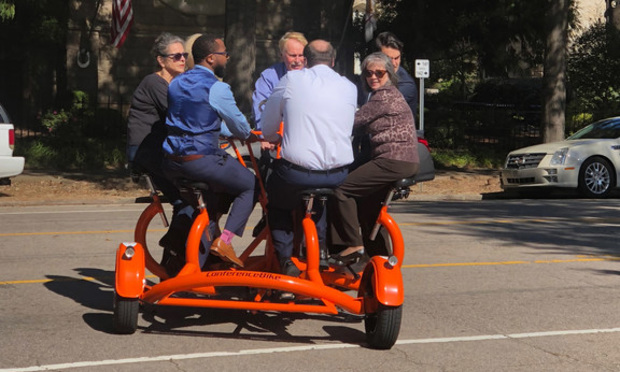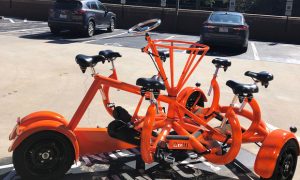This Law School Is Hitting the Road—On a Seven-Person Bike
Campbell University Norman Adrian Wiggins School of Law is the first university program in the United States to obtain a conference bike, which seats seven and lets groups conduct meetings as they cycle around town.
November 01, 2018 at 12:47 PM
3 minute read
 Campbell University Norman Adrian Wiggins School of Law acquired its conference bike in 2018. (Photo: Campbell Law)
Campbell University Norman Adrian Wiggins School of Law acquired its conference bike in 2018. (Photo: Campbell Law)
Rich Leonard got a fair share of weird looks from passersby as he cycled around Raleigh, North Carolina, on Wednesday.
That's probably because the dean of the Campbell University Norman Adrian Wiggins School of Law wasn't riding solo—he had six other law school staffers onboard the school's new conference bike.
Yes, you read that right: Conference bike.
Campbell Law looks to be the first university program in the United States to obtain a so-called conference bike, which is pretty much what it sounds like: a moving contraption that seats seven people on which you can conduct meetings while peddling around town.
Leonard understands if that sounds a little crazy, but bear with him.
“The idea is—especially in North Carolina where our climate is temperate most of the year—if you are some of my staff, or a subcommittee, if you're a student leadership group, if you're a faculty member with your advisees and you want to talk about something and get some exercise and fresh air while you do it, you can get on the bike and tool around town,” Leonard said Wednesday after taking the conference bike out for its maiden voyage.
 Leonard got the idea last spring after seeing a conference bike in Vienna, where he was attending an arbitration moot court competition with students. He immediately began investigating what it would take to get one for the law school. Campbell already has some experience on the bike front. Leonard started a bike share program three years ago, where students can check out one of four loaner bikes that are kept in the school's lobby. Students often use the bikes to zip over to externships at law firms and courts, Leonard said.
Leonard got the idea last spring after seeing a conference bike in Vienna, where he was attending an arbitration moot court competition with students. He immediately began investigating what it would take to get one for the law school. Campbell already has some experience on the bike front. Leonard started a bike share program three years ago, where students can check out one of four loaner bikes that are kept in the school's lobby. Students often use the bikes to zip over to externships at law firms and courts, Leonard said.
But the conference bike goes a big step further. It's made in Holland, and it took five months to get, in part because Leonard insisted it be made in the university's bright orange color. (This required the metal to be specially dyed.) Leonard declined to disclose how much the school paid for the bike, but said it was lower than the $12,750 listed on the manufacturer's website. He said the makers are eager to enter the U.S. market, beyond the California campuses of Google and Facebook, where they are already in use.
So what do students make of the conference bike?
“At first they were puzzled,” Leonard said. “Like, 'What has he done now?' I had to make it very clear to the students that I didn't buy this out of the operational budget. I have some very generous donors who give me money to do edgy, creative things that get the law school noticed.”
People have certainly noticed the bike around Raleigh. The school has only had it for a week, but is already fielding questions from other community groups about whether it will loan or rent the conference bike out. The school plans to keep it close, due to liability concerns, Leonard said.
While the first ride was deemed a success, the inaugural crew learned a few lessons. Namely, that the bike is heavy. About 1,000 pounds heavy.
“We realized, coming up a hill, we've all got to pedal or you won't get up,” Leonard said. “I recommend avoiding steep hills.”
This content has been archived. It is available through our partners, LexisNexis® and Bloomberg Law.
To view this content, please continue to their sites.
Not a Lexis Subscriber?
Subscribe Now
Not a Bloomberg Law Subscriber?
Subscribe Now
NOT FOR REPRINT
© 2025 ALM Global, LLC, All Rights Reserved. Request academic re-use from www.copyright.com. All other uses, submit a request to [email protected]. For more information visit Asset & Logo Licensing.
You Might Like
View All
University of Chicago Accused of Evicting Student for Attending Gaza-Israel Protest
3 minute read
Sanctioned Penn Law Professor Amy Wax Sues University, Alleging Discrimination
5 minute read

The Met Hires GC of Elite University as Next Legal Chief
Trending Stories
Who Got The Work
J. Brugh Lower of Gibbons has entered an appearance for industrial equipment supplier Devco Corporation in a pending trademark infringement lawsuit. The suit, accusing the defendant of selling knock-off Graco products, was filed Dec. 18 in New Jersey District Court by Rivkin Radler on behalf of Graco Inc. and Graco Minnesota. The case, assigned to U.S. District Judge Zahid N. Quraishi, is 3:24-cv-11294, Graco Inc. et al v. Devco Corporation.
Who Got The Work
Rebecca Maller-Stein and Kent A. Yalowitz of Arnold & Porter Kaye Scholer have entered their appearances for Hanaco Venture Capital and its executives, Lior Prosor and David Frankel, in a pending securities lawsuit. The action, filed on Dec. 24 in New York Southern District Court by Zell, Aron & Co. on behalf of Goldeneye Advisors, accuses the defendants of negligently and fraudulently managing the plaintiff's $1 million investment. The case, assigned to U.S. District Judge Vernon S. Broderick, is 1:24-cv-09918, Goldeneye Advisors, LLC v. Hanaco Venture Capital, Ltd. et al.
Who Got The Work
Attorneys from A&O Shearman has stepped in as defense counsel for Toronto-Dominion Bank and other defendants in a pending securities class action. The suit, filed Dec. 11 in New York Southern District Court by Bleichmar Fonti & Auld, accuses the defendants of concealing the bank's 'pervasive' deficiencies in regards to its compliance with the Bank Secrecy Act and the quality of its anti-money laundering controls. The case, assigned to U.S. District Judge Arun Subramanian, is 1:24-cv-09445, Gonzalez v. The Toronto-Dominion Bank et al.
Who Got The Work
Crown Castle International, a Pennsylvania company providing shared communications infrastructure, has turned to Luke D. Wolf of Gordon Rees Scully Mansukhani to fend off a pending breach-of-contract lawsuit. The court action, filed Nov. 25 in Michigan Eastern District Court by Hooper Hathaway PC on behalf of The Town Residences LLC, accuses Crown Castle of failing to transfer approximately $30,000 in utility payments from T-Mobile in breach of a roof-top lease and assignment agreement. The case, assigned to U.S. District Judge Susan K. Declercq, is 2:24-cv-13131, The Town Residences LLC v. T-Mobile US, Inc. et al.
Who Got The Work
Wilfred P. Coronato and Daniel M. Schwartz of McCarter & English have stepped in as defense counsel to Electrolux Home Products Inc. in a pending product liability lawsuit. The court action, filed Nov. 26 in New York Eastern District Court by Poulos Lopiccolo PC and Nagel Rice LLP on behalf of David Stern, alleges that the defendant's refrigerators’ drawers and shelving repeatedly break and fall apart within months after purchase. The case, assigned to U.S. District Judge Joan M. Azrack, is 2:24-cv-08204, Stern v. Electrolux Home Products, Inc.
Featured Firms
Law Offices of Gary Martin Hays & Associates, P.C.
(470) 294-1674
Law Offices of Mark E. Salomone
(857) 444-6468
Smith & Hassler
(713) 739-1250








